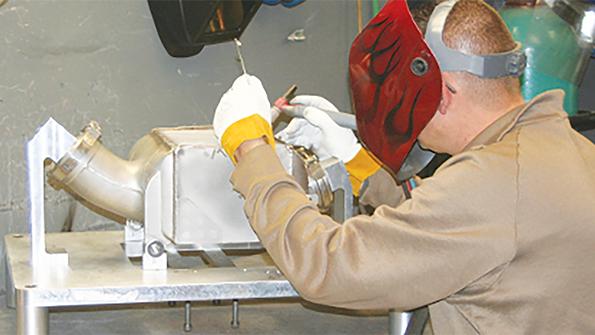
Mergers and acquisitions across aerospace and defense are expected to pick up as the effects of COVID-19 ripple across the sector. Lately, attention is turning to one niche seen as ripe for poaching: financially strained midsize manufacturers with established aftermarket revenue streams.
In mid-September, news emerged that embattled Triumph Group was fielding M&A interest from suitors, reportedly including serial A&D acquirer TransDigm Group as well as Curtiss-Wright and Woodward. None of the companies would comment on the speculation, but the prospect resonated with financial analysts who cover the sector.
“TransDigm’s success with the Esterline Technologies acquisition points to the attractiveness of acquiring large, underperforming businesses,” Jefferies analysts Sheila Kahyaoglu and Greg Konrad said Sept. 18, referring to TransDigm’s takeover of the midtier provider last year. “Triumph fits the bill, as it is in the midst of a major restructuring.”
Indeed, Triumph was shedding assets before COVID-19, but the Tier 2 company had a plan to remain a going concern that centered on aftermarket and engineering services. Triumph in August announced a deal to sell its composites operations to private equity investor Arlington Capital Partners, one of the last steps to divesting its aerostructures work. That deal is supposed to close imminently.
Since 2016, Triumph has divested 13 “noncore” businesses, including the latest announcement, as part of its downsizing efforts to reduce the corporation’s leverage. the corporation. Even so, its publicly traded share price remains down roughly 70% this year through Sept. 21.
On top of company-specific issues, the challenge for Triumph and others is that while the aftermarket usually outperforms during recessions, thanks to a healthy installed base, that is not expected to happen in this downturn due to an expected flood of airliner retirements. Industry experts forecast a 50% drop-off in commercial aftermarket business this year, according to insight offered during the Aviation Week SpeedNews Commercial Aviation Industry Suppliers Conference in September.
“With airline passenger traffic unlikely to recover 2019 volumes until 2023 or 2024, and extensive retirement or parking of older aircraft, the commercial aftermarket is set for an extended period of depressed demand,” Moody’s Investors Service said separately the month before. This will be only partially mitigated by demand for the services needed to bring a fraction of the parked aircraft back into operation.
MRO companies focusing on military aircraft maintenance, such as Vertex Aerospace Services and Ontic, should enjoy relatively robust revenue, Moody’s continued. The broader defense aftermarket outlook remains healthy, with around 60% of suppliers seeing growth, Canaccord Genuity echoed in its September supplier survey.
Eventually, the commercial aftermarket also should return, albeit lagging commercial air traffic by a few quarters, at least. “We have more confidence in the 2021 recovery, but it is fragile,” Canaccord’s Ken Herbert wrote in a commercial MRO survey report in July. “Inventory levels remain inflated, and pricing pressure has increased. Moreover, airline cash conservation is not expected to let up, and the MRO industry needs to reduce capacity; but as long as traffic continues to improve, the aftermarket recovery is a question of when, not if.”
But it remains a question of surviving until then, and several suppliers are feeling financially squeezed. According to longtime industry advisor Bill Alderman, almost 39% of respondents to a supplier survey his consultancy carried out in July said they may not have enough liquidity to ride out a prolonged downturn. Almost half of those surveyed by Alderman & Co. said they were more concerned now than they were in May.
Put it all together, and many industry observers see consolidation ramping up over the next year or so. MROs that are at risk are those with weaker balance sheets and low precrisis margins, according to Eric Bernardini, co-leader of the A&D practice at consultancy AlixPartners. The strongest effects of the downturn are expected in cabin modifications and engine overhauls, he said in May. Consolidation is “very likely,” with private equity investors seen to be interested to enter at low valuation points. “Some MRO providers and aftermarket parts providers have highly leveraged balance sheets,” he said.
Other industry analysts agree. “Because we need capital and we need restructuring, and we have many companies on the precipice, you’re going to see private equity and well-positioned holding companies, like TransDigm and Heico, public companies with strong balance sheets, and possibly governments come in and buy companies,” AeroDynamic Advisory Managing Director Kevin Michaels told an Aviation Week event Sept. 15.
The downturn has been so severe and so fast that balance sheets should be the prime factor separating different players in the manufacturing-MRO niche, rather than the traditional considerations of whether targeted companies are participating on certain aircraft programs. For instance, both TransDigm and Triumph recently issued secured debt to boost their liquidity—8% for $1.1 billion with a 2025 maturity for TransDigm and 8.875% for $700 million with a 2024 maturity for Triumph.
But TransDigm’s leaders took out the new debt as a precautionary move against COVID-19’s effects as well as to be ready for M&A, and it is currently on track to end its fiscal year with about $4.5 billion of cash. That would more than cover a purchase of Triumph, which Jefferies analysts estimated could require about $2 billion.
Triumph, meanwhile, is expected to burn through about $225 million in cash in its current fiscal year, according to UBS analysts—equivalent to roughly two-thirds of Triumph’s market capitalization of about $355 million.
TransDigm traditionally bought small providers of proprietary A&D parts, but its roughly $4 billion deal last year for Esterline proved to be such a successful foray into buying larger companies that it opened management to considering other deals. “We’d love to see some good acquisitions in our space come up, but again, that’s always hard to predict,” Executive Chairman Nick Howley said on Aug. 4. “But if we’re out there chipping away at the rock, I can’t imagine we won’t find something.”





